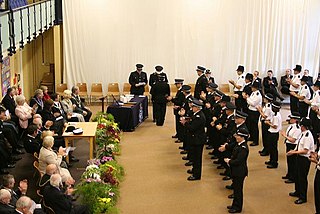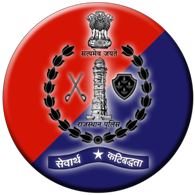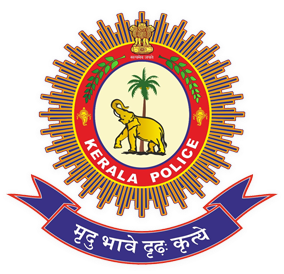This article needs additional citations for verification .(April 2008) |
Head constable was a rank used in some British and British colonial police forces, and is still used in the Indian police and Central Armed Police Forces.
This article needs additional citations for verification .(April 2008) |
Head constable was a rank used in some British and British colonial police forces, and is still used in the Indian police and Central Armed Police Forces.
Originally, head constable was the normal title for the chief officer of a borough police force in England and Wales. Throughout the later 19th century and early 20th century, this title was superseded by chief constable in most forces. A few smaller borough forces and the Liverpool City Police retained it until it was finally abolished under the Police Act 1919. However, Winchester City Police appears to have retained the title until 1943, when it was amalgamated with Hampshire Constabulary.
Head constable in the Indian police is equivalent to sergeant in police forces in other countries. Head constables wear three point-down chevrons on their sleeves or three bars on their epaulettes. [1] In Kerala Police, when serving in the local police, a head constable is designated as a senior civil police officer (SCPO). [2]
In the Royal Irish Constabulary, Royal Ulster Constabulary (until its reorganisation in 1970), and some colonial forces such as the Palestine Police, head constable was a rank between the sergeant and inspector grades, roughly equivalent to a warrant officer in the Army. In colonial forces, it was usually a rank held by Europeans only. Some colonial forces also had a higher rank of head constable major.
A constable is a person holding a particular office, most commonly in law enforcement. The office of constable can vary significantly in different jurisdictions. Constable is commonly the rank of an officer within a police service. Other people may be granted powers of a constable without holding this title.
Sergeant (Sgt) is a rank in use by the armed forces of many countries. It is also a police rank in some police services. The alternative spelling, serjeant, is used in The Rifles and other units that draw their heritage from the British light infantry. Its origin is the Latin serviens, 'one who serves', through the Old French term serjant.
Commander is a common naval officer rank as well as a job title in many armies. Commander is also used as a rank or title in other formal organizations, including several police forces. In several countries, this naval rank is termed as a frigate captain.

Chief Constable is the rank used by the chief police officer of every territorial police force in the United Kingdom except for the City of London Police and the Metropolitan Police, as well as the chief officers of the three 'special' national police forces, the British Transport Police, Ministry of Defence Police, and Civil Nuclear Constabulary. The title is also held by the chief officers of the principal Crown Dependency police forces and the Sovereign Base Areas Police in Cyprus. The title was also held, ex officio, by the president of the Association of Chief Police Officers under the Police Reform Act 2002. It was also the title of the chief officer of the Royal Parks Constabulary until this agency was disbanded in 2004.
Police ranks are a system of hierarchical relationships in police organisations. The rank system defines authority and responsibility in a police organisation, and affects the culture within the police force. Usually, uniforms denote the bearer's rank by particular insignia affixed to the uniforms.

The Special Constabulary is the part-time volunteer section of statutory police forces in the United Kingdom and some Crown dependencies. Its officers are known as special constables.
Chief superintendent is a senior rank in police forces, especially in those organised on the British model.
Inspector, also police inspector or inspector of police, is a police rank. The rank or position varies in seniority depending on the organization that uses it.
Superintendent (Supt) is a rank in the British police and in most English-speaking Commonwealth nations. In many Commonwealth countries, the full version is superintendent of police (SP). The rank is also used in most British Overseas Territories, in many former British colonies, as well as in Portugal and in several former Portuguese colonies. In some countries, such as Italy, the rank of superintendent is a lower rank.

The Rajasthan Police is the law enforcement agency for the state of Rajasthan in India. The Rajasthan Police has its headquarters in the Jaipur, the state capital. The motto of the force is "committed to serve".

The Metropolitan Special Constabulary (MSC) is the volunteer police force of the Metropolitan Police Service. It is one of three Special Constabularies operating within London, the others being part of the City of London Police and British Transport Police. The service was created over 190 years ago under the Special Constables Act 1831. As of November 2021 it consists of 1,450 officers, making it the largest in the UK.

Gazetted officers include all the Indian Police Service officers which are Group A officers of the cadre and all State Police Services officers of and above the rank of Deputy Superintendent of Police. All are arranged in a hierarchical order.
Sub-inspector (SI), or sub-inspector of police or police sub-inspector (PSI), is a rank used extensively in South Asia: in the police forces of Bangladesh, Pakistan, India, and Sri Lanka, which are primarily based on the British model. It was formerly used in most British colonial police forces and in certain British police forces as well. The rank usually was in charge of a police substation or assisted an inspector.
The New Year Honours 1914 were appointments by King George V to various orders and honours to reward and highlight good works by members of the British Empire. They were announced on 2 January 1914.
Penzance Borough Police was the police force for the borough and corporate town of Penzance, Cornwall, from 1836 to 1947. It was formed following the passing of the Municipal Corporations Act 1835, which reformed all UK boroughs, and stipulated that each appoint a Watch Committee to oversee a police force. The police force formed part of the commonality of the town's government, led by an elected Mayor, six aldermen and eighteen councillors.
The 1938 New Year Honours were appointments by King George VI to various orders and honours to reward and highlight good works by citizens of the United Kingdom and British Empire. They were announced on 1 January 1938.
The 1939 New Year Honours were appointments by King George VI to various orders and honours to reward and highlight good works by citizens of the United Kingdom and British Empire. They were announced on 30 December 1938.
The 1936 New Year Honours were appointments by King George V to various orders and honours to reward and highlight good works by citizens of the United Kingdom and British Empire. They were announced on 31 December 1935.

The Kerala Police is the law enforcement agency for the Indian state of Kerala. Kerala Police has its headquarters in Thiruvananthapuram, the state capital. The motto of the force is "Mridhu Bhave Dhrida Kruthye" which means "Soft in Temperament, Firm in Action" in Sanskrit. It operates under the Department of Home Affairs, Government of Kerala. The force is headed by the State Police Chief, and the incumbent chief is Shaikh Darvesh Sahib, IPS.